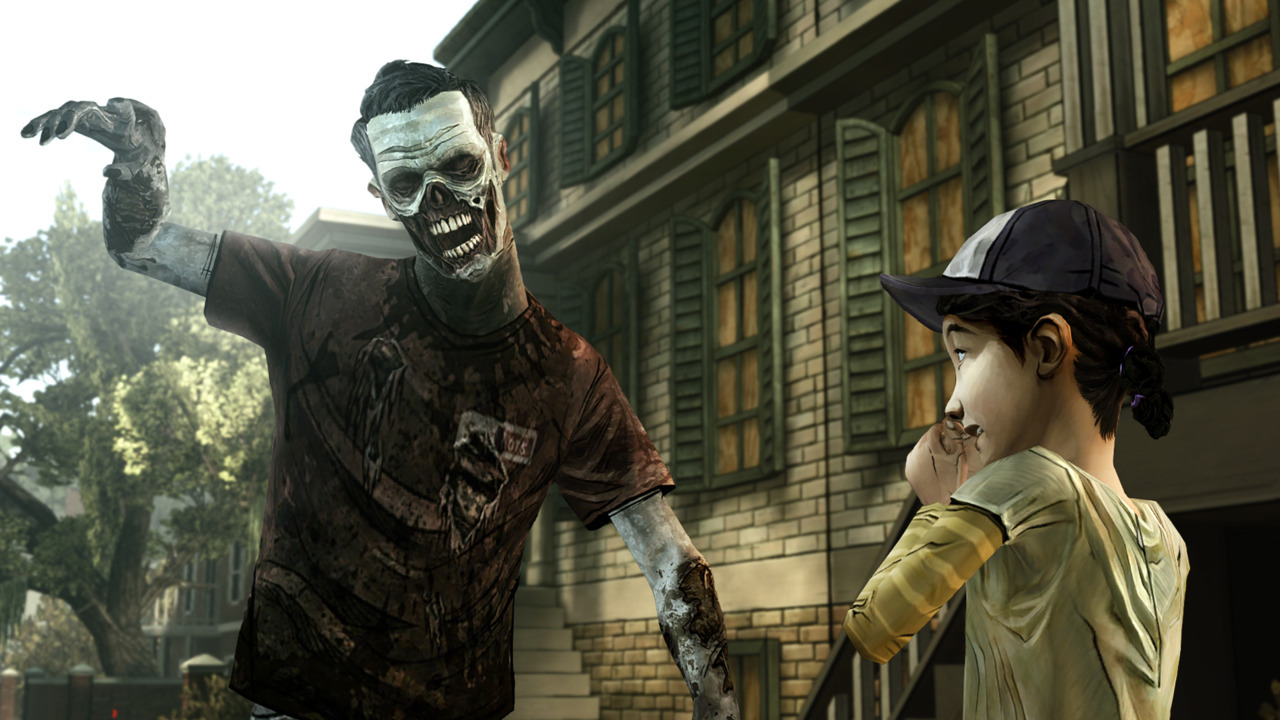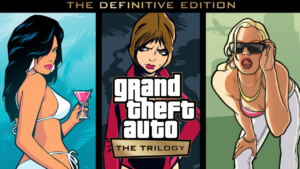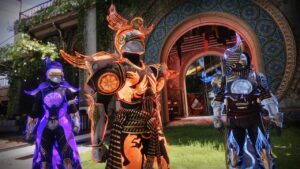Episodic gaming always seemed born of necessity. Game development is hard work and breaking a story into smaller parts and releasing it progressively appeared, at least from the outside, to be a way to manage smaller projects with a rolling development structure. In its heyday, no one was more successful at this than Telltale Games, which made its name on adventure games, mostly licensed, with a strong episodic structure. Its breakthrough success, and still one of the best episodic experiences of all time, was The Walking Dead, which turns 10 years old today, April 24. The first season, especially, created appointment viewing for video games, and in the process made for one of the most emotionally resonant video game stories in my lifetime.
The idea of “appointment viewing” may be foreign to those who didn’t grow up in the era of “Must See TV” Thursdays, TGIF Fridays, and Simpsons Sundays. The term refers to an era of workplace water cooler culture, where it was fashionable to keep up with a few key shows and chat about them at work the next day. If you didn’t catch the show, you missed out on the conversation. This still exists to some extent with mega-hits like Game of Thrones or streaming shows that premiere on a particular day, as the hive-mind of Twitter rushes to share its opinions on the latest plot revelations. But it’s more fragmented now. A few breakout events aside, like the Super Bowl, we don’t often have a national conversation about a single television show. In the wake of Telltale’s Walking Dead, streaming culture has become the dominant entertainment medium and created a voracious appetite for content, wherein viewers consume a new show almost immediately and move on to the next.
That dynamic goes for video games, too. Games are diverse and have historically been more niche than television. When a massive success breaks through, like Pokemon Go or Elden Ring, it’s notable because it reaches a level of mainstream conversation that isn’t present for most other games. It’s often not practical to center the gaming community’s attention around a single subject, which makes what Telltale accomplished 10 years ago that much more impressive.
The Walking Dead: The Telltale Series was not the first breakout hit that carried The Walking Dead name, of course. It was riding the success of a hit AMC series that had premiered just a couple of years earlier, and both of them were based, in their own ways, on the popular comic books by writer Robert Kirkman and artists Tony Moore and Charlie Adlard. But the video game series was unique in that it told an original story set within the world created by Kirkman. The TV series focused primarily on Rick Grimes, which borrowed much from the character of the same name in the comic books. The Telltale Series instead puts you into the shoes of an entirely new character, Lee Everett, a convicted felon with a heart of gold who stumbles on an orphaned little girl named Clementine.
It’s a classic lone-wolf-and-cub story, the kind we’ve seen replicated countless times in other popular media like Sweet Tooth and The Mandalorian. The relationship in these stories is the beating heart of the audience’s emotional investment: You watch as a wise but world-weary protector teaches a young ward how to navigate the strange terrain, and their bond brings out emotional depths that the elder character thought they’d lost. What made The Walking Dead different was that you were the wise protector, which amplified the feeling of connection and imbued a fierce level of loyalty and protectiveness over Clementine.
It was a perfect contextual framework for a game centered around tense decision-making. Did you lie to Hershel? Did you loot the car? In the end most of these choices didn’t matter to the overall narrative. Even choices that had long-term ramifications over multiple episodes, like saving Carly or Doug, eventually funneled back to the same point. You were going down-river and you could steer the boat along the current, but you were always flowing toward the same point.
However, the emotional context of these choices made them feel significant, because the real goal of the game wasn’t about reaching a destination. It was about deciding what matters to you. In a world where most of the societal strictures and niceties no longer apply or have become unrecognizable, what would you choose to discard and maintain? Why are those standards important to you? Playing The Walking Dead and making these decisions forced moments of introspection, not just about the game but about yourself.
This element made the game a rich vein for shared discussions, and Telltale facilitated that by displaying stats on each major decision point at the end of every episode. I had a regular understanding with one of my longest-lasting friends that after each episode we would chat about our decisions. Often our choices lined up, but sometimes they didn’t. We would talk about our internal reasoning and why we made the decisions that we did. Sometimes a choice that I had thought of as indefensible made more sense when I heard his reasoning. I hadn’t considered his assumptions, or he reached a conclusion about another character’s hidden motivations that made him less trusting of them. These conversations, and exploring how our divergent choices were reflections of our own ideals and personalities, helped us grow closer as friends.
By the time we reached the fifth and final episode of the first season, Telltale had fully embraced the emotional connection it had created with its wolf-and-cub story. With Lee having suffered a zombie bite and Clementine abducted, it had put the pieces in place for a perfect ticking clock scenario. The hero was doomed, but there was one more thing he needed to do before he died. The emotional notes were preparing for a crescendo.
And when that crescendo finally came, it was devastating. The stranger who had abducted Clementine was a nobody, a reflection of the choices you had made along the way whose impact was dulled by the meta-knowledge that he would have abducted Clem if you’d made all of the opposing choices too. The bigger emotional impact was the one we saw coming: the bite, the inevitability of death, the end of Lee’s story.
So when we came to the end, the lone wolf had one more set of lessons for his cub. This time it wasn’t about directing the flow of a video game, steering a boat that’s at the mercy of the current. By this point I was completely invested in Clementine as a real, human person. I wanted her to thrive in this broken world without me. I wanted to feel like I was passing on something important. Lee choked out his final words–be compassionate, care for others even when it’s risky, hold onto your humanity. I let Clementine go, then demanded that she leave. I didn’t ask her to shoot me. I couldn’t imagine making her go through that.
When I met with my friend this time, our decisions diverged more than usual. His final words to Clementine were generally more practical, more focused on survival, less naive. Mine were more principled, attempting to hold onto some humanity and innocence. As usual I don’t think either of us got it wrong, but it held a mirror up to our values. He wanted her safe, and I wanted her to carry the parts of humanity worth saving.
The Walking Dead would continue for three more seasons, and Clementine’s importance would wax and wane throughout. She took the lead, as an adult, in the final season–which was unfortunately overshadowed by Telltale’s untimely shutdown. To be honest, I never finished the series, having fallen off sometime during Season 3. Or maybe it was Season 2? I understand that Clementine’s season was especially great. But for me, I don’t feel compelled to see the rest, or to make those final choices for her.
As a parent, you spend your entire life preparing your children to face the world without you. You accept that someday they’ll be on their own, and maybe you’ll be gone, and you just have to hope you pointed them in the right direction and gave them the tools they would need and the understanding of how to use them. As Lee, a surrogate parent of a fictitious child, I already did all that I can do for Clementine. Stepping into her mind and making her final decisions would cheapen that experience for me. The entire catharsis of the first season of The Walking Dead was coming to terms with letting go. I already have.
- Coinsmart. Europe’s Best Bitcoin and Crypto Exchange.
- Platoblockchain. Web3 Metaverse Intelligence. Knowledge Amplified. FREE ACCESS.
- CryptoHawk. Altcoin Radar. Free Trial.
- Source: https://www.gamespot.com/articles/telltales-the-walking-dead-was-a-game-about-you-not-zombies/1100-6502718/?ftag=CAD-01-10abi2f
- About
- Adventure
- All
- Another
- appetite
- April
- around
- Artists
- audience
- before
- BEST
- Books
- breakout
- car
- care
- Catch
- child
- Children
- choice
- choices
- closer
- coming
- community
- Conclusion
- consume
- content
- continue
- Conversation
- conversations
- could
- Couple
- created
- Culture
- Current
- day
- dead
- Development
- DID
- died
- different
- During
- emotionally
- Entertainment
- events
- experience
- Experiences
- Face
- Finally
- First
- flow
- focused
- Framework
- game
- Games
- Gaming
- Gold
- great
- Grimes
- Grow
- having
- hidden
- hold
- How
- How To
- HTML
- HTTPS
- human
- Humanity
- i
- idea
- Impact
- important
- investment
- IT
- Key
- large
- latest
- lead
- Level
- licensed
- lifetime
- Loyalty
- Mainstream
- major
- MAKES
- Making
- manage
- Matters
- May
- Media
- medium
- mine
- mirror
- more
- move
- National
- Niche
- Opinions
- original
- Other
- own
- perfect
- Playing
- Point
- pokemon
- Popular
- premiere
- present
- Process
- projects
- reflection
- Reflections
- relationship
- REST
- Ring
- ROBERT
- s
- safe
- saving
- sense
- Series
- set
- Share
- shared
- significant
- smaller
- spend
- standards
- stats
- Stories
- Story
- streaming
- success
- successful
- Super Bowl
- sweet
- talk
- television
- The
- the world
- Through
- Throughout
- time
- Today
- tools
- tv
- unique
- us
- Video
- video games
- viewers
- walking
- walking dead
- Watch
- Water
- WAX
- What
- WHO
- within
- Wolf
- words
- Work
- Workplace
- world
- worth
- writer
- years
- youtube












